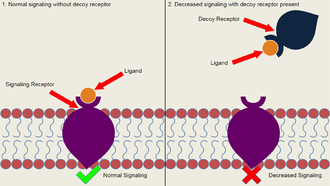Decoy receptors
Decoy Receptors
Decoy receptors are a class of receptors that bind to specific ligands but do not initiate a signal transduction cascade. Instead, they act as "decoys" by sequestering ligands away from their functional receptors, thereby modulating the biological activity of these ligands. This mechanism is crucial in regulating various physiological and pathological processes, including immune response, inflammation, and cancer progression.
Mechanism of Action
Decoy receptors function by competitively binding to ligands that would otherwise interact with signaling receptors. By doing so, they prevent the activation of downstream signaling pathways. This can lead to a decrease in the biological activity of the ligand, effectively "neutralizing" its effects. Decoy receptors are often structurally similar to their signaling counterparts, allowing them to bind ligands with high affinity.
Types of Decoy Receptors
There are several types of decoy receptors, each with specific roles in different biological contexts:
- Cytokine Decoy Receptors: These receptors bind to cytokines, preventing them from interacting with their signaling receptors. An example is the IL-1 receptor type II, which acts as a decoy for interleukin-1.
- Chemokine Decoy Receptors: These receptors sequester chemokines, modulating immune cell trafficking. D6 is a well-known chemokine decoy receptor that binds to inflammatory chemokines.
- Growth Factor Decoy Receptors: These receptors bind to growth factors, inhibiting their ability to promote cell proliferation. An example is the decoy receptor for vascular endothelial growth factor (VEGF), which can inhibit angiogenesis.
Biological Significance
Decoy receptors play a critical role in maintaining homeostasis within the body. By regulating the availability of ligands, they help control processes such as:
- Immune Regulation: By modulating cytokine and chemokine activity, decoy receptors can influence immune cell behavior and inflammatory responses.
- Tumor Suppression: In the context of cancer, decoy receptors can inhibit tumor growth by sequestering growth factors and preventing angiogenesis.
- Autoimmunity: Decoy receptors can help prevent autoimmune reactions by limiting the activity of pro-inflammatory cytokines.
Clinical Implications
Understanding the function of decoy receptors has significant implications for the development of therapeutic strategies. By targeting decoy receptors, it may be possible to modulate disease processes such as chronic inflammation, autoimmune diseases, and cancer. For instance, enhancing the activity of decoy receptors could be a strategy to reduce excessive inflammatory responses in autoimmune diseases.
Related Pages
| Biochemistry | ||||||||||
|---|---|---|---|---|---|---|---|---|---|---|
This biochemistry related article is a stub.
|
Transform your life with W8MD's budget GLP-1 injections from $125.
W8MD offers a medical weight loss program to lose weight in Philadelphia. Our physician-supervised medical weight loss provides:
- Most insurances accepted or discounted self-pay rates. We will obtain insurance prior authorizations if needed.
- Generic GLP1 weight loss injections from $125 for the starting dose.
- Also offer prescription weight loss medications including Phentermine, Qsymia, Diethylpropion, Contrave etc.
NYC weight loss doctor appointments
Start your NYC weight loss journey today at our NYC medical weight loss and Philadelphia medical weight loss clinics.
- Call 718-946-5500 to lose weight in NYC or for medical weight loss in Philadelphia 215-676-2334.
- Tags:NYC medical weight loss, Philadelphia lose weight Zepbound NYC, Budget GLP1 weight loss injections, Wegovy Philadelphia, Wegovy NYC, Philadelphia medical weight loss, Brookly weight loss and Wegovy NYC
|
WikiMD's Wellness Encyclopedia |
| Let Food Be Thy Medicine Medicine Thy Food - Hippocrates |
Medical Disclaimer: WikiMD is not a substitute for professional medical advice. The information on WikiMD is provided as an information resource only, may be incorrect, outdated or misleading, and is not to be used or relied on for any diagnostic or treatment purposes. Please consult your health care provider before making any healthcare decisions or for guidance about a specific medical condition. WikiMD expressly disclaims responsibility, and shall have no liability, for any damages, loss, injury, or liability whatsoever suffered as a result of your reliance on the information contained in this site. By visiting this site you agree to the foregoing terms and conditions, which may from time to time be changed or supplemented by WikiMD. If you do not agree to the foregoing terms and conditions, you should not enter or use this site. See full disclaimer.
Credits:Most images are courtesy of Wikimedia commons, and templates, categories Wikipedia, licensed under CC BY SA or similar.
Contributors: Prab R. Tumpati, MD

